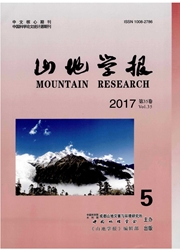

 中文摘要:
中文摘要:
这篇文章在西南的中国的山在三个不同旅游地点探索在风景经验和环境保存努力的旅游者认知之间的关系。1500 所在地的问询表调查的一个总数被散布, 1142 张有效问询表被用于统计分析。从多组路径分析的结果证明文化风景经验的认知和自然风景经验的认知在环境保存行为和旅游者的行为意愿上有积极影响。从在三个旅游地点之中的比较分析的结果显示文化风景经验的那认知有更强壮的力量比自然风景经验的认知预言高级环境保存行为和行为意愿,而自然风景经验的认知有更多的力量比文化风景经验的认知预言一般环境保存行为和行为意愿。而且,我们的调查结果利益在旅游地点的环境管理和可持续性。
 英文摘要:
英文摘要:
This article explores the relationship between the tourist’s cognition of the landscape experience and the environmental conservation efforts at three distinct tourist sites in mountains of southwestern China. A total of 1500 on-site questionnaire surveys were distributed and 1142 valid questionnaires were used for statistical analysis. Results from multi-group path analysis showed that both cognition of the cultural landscape experience and cognition of the natural landscape experience had positive impacts on environmental conservation behaviors and behavior intentions of tourists. Results from comparative analysis among the three tourist sites indicated that cognition of the cultural landscape experience had a stronger power to predict senior environmental conservation behaviors and behavior intentions than cognition of the natural landscape experience, whereas cognition of the natural landscape experience had more power to predict general environmental conservation behaviors and behavior intentions than cognition of the cultural landscape experience. Furthermore, our findings benefit environmental management and sustainabilityat tourist sites.
 同期刊论文项目
同期刊论文项目
 同项目期刊论文
同项目期刊论文
 Investigating the motivation–experience relationship in a dark tourism space: A case study of the Be
Investigating the motivation–experience relationship in a dark tourism space: A case study of the Be 期刊信息
期刊信息
